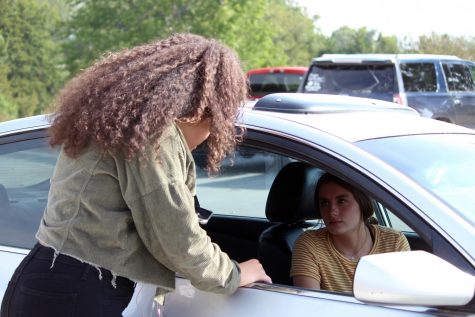Parents, teenagers need to find balance
“Imagine that you had invested 15 years of your life into growing this plant,” said Dr. Bradford Wiles, Associate Professor and Extension Specialist in the Department of Human Ecology at K-State who studies parent-child relationships. “And that plant is now about to be dropped out of a helicopter, meaning that it is going to be outside after being inside all its life. That’s scary, right? That’s really scary. It’s not anger, they’re not angry that you’re going to jump out of a helicopter, they’re fearful. They’re really afraid. Because it’s not the fall that kills you, it’s the sudden stop.”
Many teens struggle to understand why their parents have the rules they do, whether it be curfews, academic expectations or household responsibilities. While this lack of understanding is common among teens, most parenting — strict or relaxed, or somewhere in between — comes from a concern for teens’ wellbeing.
However, while this fear should be understood by teens, there is a point where parents’ involvement becomes a negative influence.
“I started 30 years ago, and there’s a lot more parents who have overinvolved, who almost do too much, now than there was three decades ago,” Manhattan High Counseling Department head Eric Ross said. “I think it’s important for parents to support and be involved, but also understand that students are in the process of becoming adults and need to do things for themselves.”
Striking the balance between allowing a teen to make mistakes they can learn from and steering them away from more serious ones creates a dilemma for parents, and it remains a cause of frustration for Manhattan High students who feel their parents have too much control over their lives.
“What I would say to parents is: ‘hey, eventually you’re going to want your child to leave your house,’” Wiles said. “If you want them to leave your house and have a good chance at being successful, you have to let them learn lessons in ways that you cannot possibly teach them… There’s no substitute for experience. And, sometimes experience is something you have right after you needed it. But in the end, for parents that are having a really hard time letting go of their ability to essentially control more of their children’s lives, that’s a losing battle. That’s only going to generate some animosity.”
Parents often direct their concerns and involvement towards teens’ academics. A child’s school performance impacts what, if any, university they attend, the scholarships they earn and potentially the career path they choose. Desires for success can lead to over-involvement in a student’s academic career, but having under-involved parents can also inhibit a teenager’s success.
“The balance is: trust, but verify,” Wiles said. “You want to trust that your child is doing his or her homework. But, it’s not enough to just trust that, you have to verify that they are… And the important part of this process is that as you are able to verify, you can increase your level of trust so that you don’t have to verify nearly as often. So what does that do? That creates that trust and that recognition from your child, that they trust you to do the right thing, to do your homework and that they don’t have to continue to check… And so it’s really incumbent upon the parents to engage in that and be judicious about when to verify. If you keep verifying every time after that at the same rate, even though you’ve established trust, that’s just going to establish distrust… And so it’s really about tightening and relaxing based on the extent to which expectations are being met.”
Because the level of involvement changes depending on whether students meet parental expectations, there is no one, true parenting style that works without fail. And, contrary to some student’s wishes, because parents need to have some expectations, parenting does still need to happen during teenage years.
“Every family is different,” Ross said. “I think kids, even though they don’t want to admit it, they need structure, they need parameters. It’s a balancing act between structure and just free rein. You want your kids to grow up and be somewhat independent. And I say this as a parent of two adults, you want to be involved but not over-involved… If you swing too far in either direction, it’s going to make it harder for students.”
According to Wiles, expectations and mentoring from parents does not and should not be one that is demanding but without responsiveness. The best parent-teen relationships rely on communication and sometimes compromise, as well as trust and reciprocity. Teens need to have some faith in their parents’ reasoning and goodwill, as well as contribute to a two-way relationship with their parents.
“The main thing is just really being compassionate and communicative, that’s the most important thing,” Wiles said. “If you come together to problem solve, that’s a much better orientation than coming together to punish or to be punished.”
While most parents are not perfect, teens need to understand and respect that parents are trying.
“I would really encourage forgiveness from the teen side to the parents,” Wiles said. “It’s really hard as a teenager to recognize how much your parents care about you, how much the things that they are doing that seem so hard to understand as an adolescent are really to help you and to protect you. It seems just so controlling and onerous, but they’re not doing it to control you, I promise you that is not the motivation. It’s much more about trying to help you make it to adulthood.”






